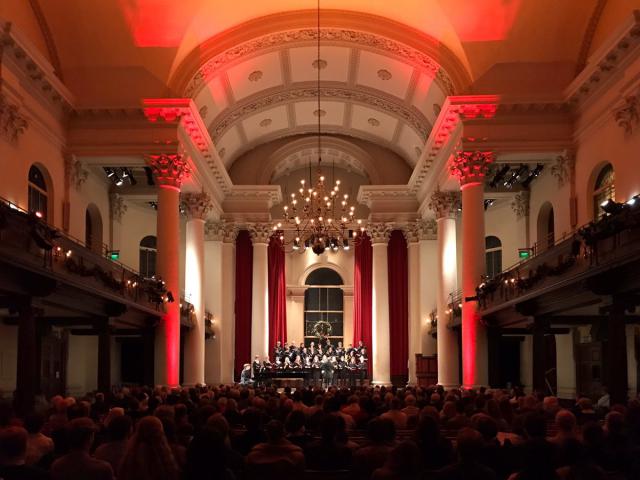Festive Bach Weihnachts-Oratorium (Christmas Oratorio) BVW248 at St John's Smith Square with The Orchestra of the Age of Enlightenment conducted by Stephen Layton, with the Choir of Trinity College, Cambridge, and soloists Anna Dennis, Helen Charlston, Gwilym Bowen, and Matthew Brook. Wonderful to experience it at St John's Smith Square at Christmas, once a baroque church, now one of the most celebrated of vanues for baroque and early music. The lights of the chandelier were reflected in the window behind : a magical optical illusion. The auditorium was lit in gold and red. During the performance a door was opened so light shone in from the back of the hall as well as from the front. If this was an accident, it was a happy one. Going home along the Thames by the Embankment increased the impact still further.
The Orchestra of the Age of Enlightenment - who are incapable of doing dull - felt freer and livelier in this joyfyul atmosphere. A punchy opening : natural horns and drums creating a suitably rustic ambience. Christ was born in a stable, to a refugee mother fleeing from persecution Forget that, and miss the whole point of the Nativity. The audacity of the concept : God Made Man ! "Jauchzet, frohlocket! auf, preiset die Tage" A miracle has happened. If we don't feel excitement, there's something wrong with us, whatever we believe, be excited. Hence the value of period performance, where unsophisticated instruments are played with energetic verve, creating music which, however divine, never loses a human touch. The brighter, lighter textures of period instruments sparkle at faster tempi, further enhancing the sense of adventure. For singers, this means greater emphasis on diction and clarity. For singers of the calibre of the Choir of Trinity College, Cambridge, this presents no problems. You don't get to sing at this level unless you're very good, and most of these singers have come through top level youth ensembles. The Oxbridge style matters, too, giving the singing youthful freshness and enthusiasm that comes from the heart. In Part II, "The Adoration of the Shepherds", the mood is more contemplative. Layton brought out gentler rhythms, evoking the rocking of a cradle :gentle rapture. "Ach mein herzliebes Jesulein, Mach dir ein rein sanft Bettelein".
The voices became hushed, soloists blended into the chorus.
The Evangelist is a tenor (Gwilym Bowen), higher voices in the baroque are associated with heroes. The "English tenor" Fach has its roots in the ardent rapture of the sacred oratorio, where sincerity is of the essence, beauty lies in the ideas being expressed not independent thereof. The Evangelist is haloed by cello, bassoon and continuo. The purity of the concept of the Nativity is further highlighted by the restraint of Bach's orchestration. Soloists are supported with the addition of other instruments: oboe d'amore forr the alto, trumpet and extra violins for the bass. The larger orchestra comes into focus when the voices are employed in larger combinations. In this performance, the occasion being Christmas, we heard Parts I, II and III with Part VI, where all four soloists participate, in accord with chorus and orchestra. Again, the mood is worshipful, but not subdued, despite the more restrained tempi, for the miracle of the Nativity has come to pass.

No comments:
Post a Comment